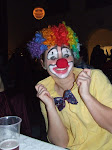Today, with Marlena and Gosia, we started our practice in Fjordskolen in Aabenraa. The school is divided for three departments (A, B and C). Each of them has children with different diseases.
I started in deparment C. My tutoress is Louise, a physiotherapist, who has been working in Fjordskolen since 2001. In this part of school there is about 125 students with many different diagnosis, some of them are:
• General developmental disorders
• Cerebral palsy
• Muscles dystrophy
• Spinal bifida
• Speak and language disabilities
• Epilepsy
• Deaf and blind
• Syndromes (Down-, Griscelli-, William’s syndrome)
The treatment is done individually, in groups in the gym, in the hot water pool, in the outdoor surroundings of the school.
Some general information:
o most of children come to school by special bus (from Aabenraa and surrounding towns)
o classes star at 8.20 and finish at 12, but most of children go later to after- classes lessons, where they usually spend their time playing
o lesson lasts 45 minutes
o in class usually is about 8 students
o its happens that pupils are in different age, its depend on diseases and development
o in class there are minimum 2 teachers
o lots of children have very good intellect and have only some attention problems (for example ADHD disease)
Today I could see how Louise works with three students.
Josephine – 9 years old girl with
Cerebral Palsy; additionally she has
scoliosis and
epilepsy; she can’t speak and walk only with help.At Fjordskolen she is the third year and now she attends to the 2nd class.
In her class is 8 children . They have also a Cerebral Palsy and additionally a Down Syndrome.
Exercises:
- going up and down the stairs;
- walking in a special equipment which helps her to keep balance (this exercise is more difficult, but therapist wants to motivate her to start walking alone);

The problem with Josephine is that she doesn’t start any move without help. The therapist has to initiate and direct and not till then J. can continue.
Louise sometimes sings during the walking, what makes J. more eager to exercise.
Benjamin – 7 years boy with
General Learning Disabilities;
psychomotoric problems; attention disability; problems with balance, muscletonus, coordination.He finished a ‘normal ‘ kindergarten and now attends to the 1st class.
Exercises:
- riding on some kind of skateboard and carry a pieces of puzzle from on to the s
 econd part of gym;
econd part of gym; - kneeling down on the same desk; he kept one end of line and Louise the second one; she pulled him and B. had to try keep a balance;
- play in fishing;
The aim of the exercising was to strengthen his back and practice keeping balance.
Mikkel – 7 years old boy with
William’s Syndrome;
General developmental disorders; heart disease; attention, balance problems.Exercises:

- on the trampoline;

- walking on the balance beam;
- ‘flying on the balloon’;
- circuit track;
- exercises with big ball (pushing, throwing, keeping balance by sitting on it)

For M. the main aim is fight with his very big acrophobia !


















